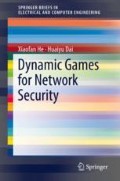Abstract
In this chapter, we continue our exploration of dynamic security games with information asymmetry. As compared to the previous chapter, the discussions in this chapter focus on the complementary scenarios where the defender lacks information about the ongoing security competitions. Such scenarios exist in many practical security problems. The framework of Bayesian SG will be employed in this chapter to model and analyze such incomplete information dynamic security problems. Accordingly, a new algorithm, termed Bayesian Nash-Q, that allows the defender to infer the missing information based on repeated interactions with the attacker and the dynamic environment will be presented. This algorithm is a natural combination of the conventional repeated Bayesian games and the Nash-Q algorithm. For this reason, our discussion starts from reviewing some elementary concepts of Bayesian games, and then the Bayesian SG model and the Bayesian Nash-Q algorithm will be discussed in details.
Access this chapter
Tax calculation will be finalised at checkout
Purchases are for personal use only
References
L. Busoniu, R. Babuska, B. De Schutter, A comprehensive survey of multiagent reinforcement learning. IEEE Trans. Syst. Man Cybern. C 38(2), 156–172 (2008)
Q. Zhu, T. Basar, Dynamic policy-based IDS configuration, in IEEE Conference on Decision and Control (IEEE, New York, 2009), pp. 8600–8605
X. He, H. Dai, P. Ning, R. Dutta, Dynamic IDS configuration in the presence of intruder type uncertainty, in 2015 IEEE Global Communications Conference (GLOBECOM) (IEEE, New York, 2015), pp. 1–6
A. Sampath, H. Dai, H. Zheng, B.Y. Zhao, Multi-channel jamming attacks using cognitive radios, in Proceedings of 16th International Conference on Computer Communications and Networks, 2007 (ICCCN 2007) (IEEE, 2007, New York), pp. 352–357
B. Wang, Y. Wu, K.J.R. Liu, T.C. Clancy, An anti-jamming stochastic game for cognitive radio networks. IEEE J. Sel. Areas Commun. 29(4), 877–889 (2011)
Y. Wu, B. Wang, K.J.R. Liu, T.C. Clancy, Anti-jamming games in multi-channel cognitive radio networks. IEEE J. Sel. Areas Commun. 30(1), 4–15 (2012)
H. Li, Z. Han, Dogfight in spectrum: combating primary user emulation attacks in cognitive radio systems, Part I: known channel statistics. IEEE Trans. Wirel. Commun. 9(11), 3566–3577 (2010)
E. Altman, K. Avrachenkov, A. Garnaev, Jamming in wireless networks under uncertainty. Mob. Netw. Appl. 16(2), 246–254 (2011)
X. He, H. Dai, P. Ning, R. Dutta, A stochastic multi-channel spectrum access game with incomplete information, in Proceedings of IEEE ICC, London, June (2015)
J.C. Harsanyi, Games with incomplete information played by “Bayesian players. Manag. Sci. 50(12_supplement), 1804–1817 (2004)
R. Gibbons, A Primer in Game Theory (Harvester Wheatsheaf, New York 1992)
J.S. Jordan, Bayesian learning in repeated games. Games Econ. Behav. 9(1), 8–20 (1995)
B. Mukherjee, L.T. Heberlein, K.N. Levitt, Network intrusion detection. IEEE Netw. 8(3), 26–41 (1994)
I. Butun, S. Morgera, R. Sankar, A survey of intrusion detection systems in wireless sensor networks. IEEE Commun. Surv. Tutorials 16(1), 266–282 (2014)
T.F. Lunt, A survey of intrusion detection techniques. Comput. Secur. 12(4), 405–418 (1993)
H. Debar, M. Dacier, A. Wespi, Towards a taxonomy of intrusion-detection systems. Comput. Netw. 31(8), 805–822 (1999)
S. Axelsson, Intrusion detection systems: a survey and taxonomy. Technical report, Department of Computer Engineering, Chalmers University, 2000
T. Anantvalee, J. Wu, A survey on intrusion detection in mobile ad hoc networks, in Wireless Network Security (Springer, Berlin, 2007), pp. 159–180
P. Garcia-Teodoro, J. Diaz-Verdejo, G. Maciá-Fernández, E. Vázquez, Anomaly-based network intrusion detection: techniques, systems and challenges. Comput. Secur. 28(1), 18–28 (2009)
N.S. Evans, R. Dingledine, C. Grothoff, A practical congestion attack on Tor using long paths, in USENIX Security Symposium, pp. 33–50 (2009)
M.L. Littman, Markov games as a framework for multi-agent reinforcement learning, in Proceedings of ICML, New Brunswick, NJ (1994)
Author information
Authors and Affiliations
Rights and permissions
Copyright information
© 2018 The Author(s)
About this chapter
Cite this chapter
He, X., Dai, H. (2018). Dynamic Security Games with Incomplete Information. In: Dynamic Games for Network Security. SpringerBriefs in Electrical and Computer Engineering. Springer, Cham. https://doi.org/10.1007/978-3-319-75871-8_4
Download citation
DOI: https://doi.org/10.1007/978-3-319-75871-8_4
Published:
Publisher Name: Springer, Cham
Print ISBN: 978-3-319-75870-1
Online ISBN: 978-3-319-75871-8
eBook Packages: EngineeringEngineering (R0)

